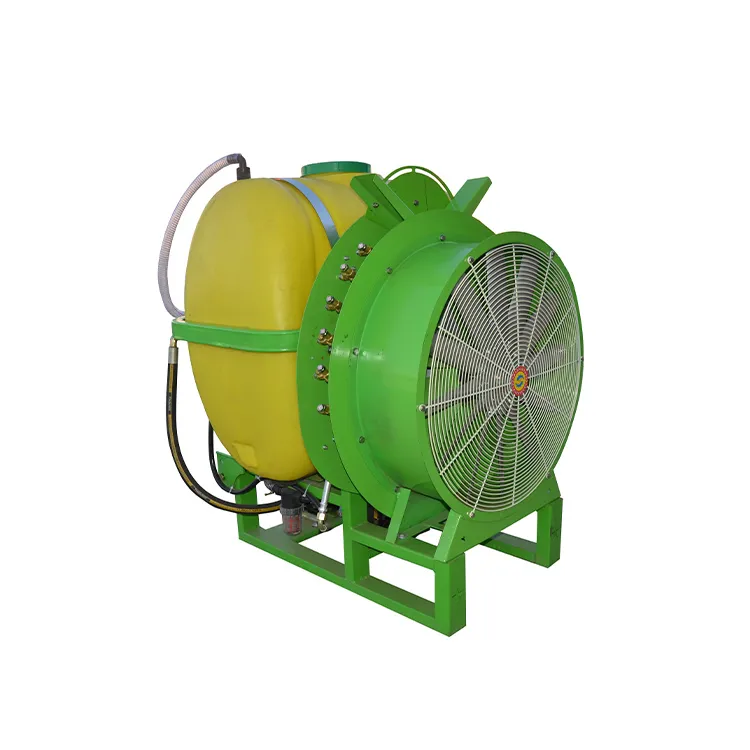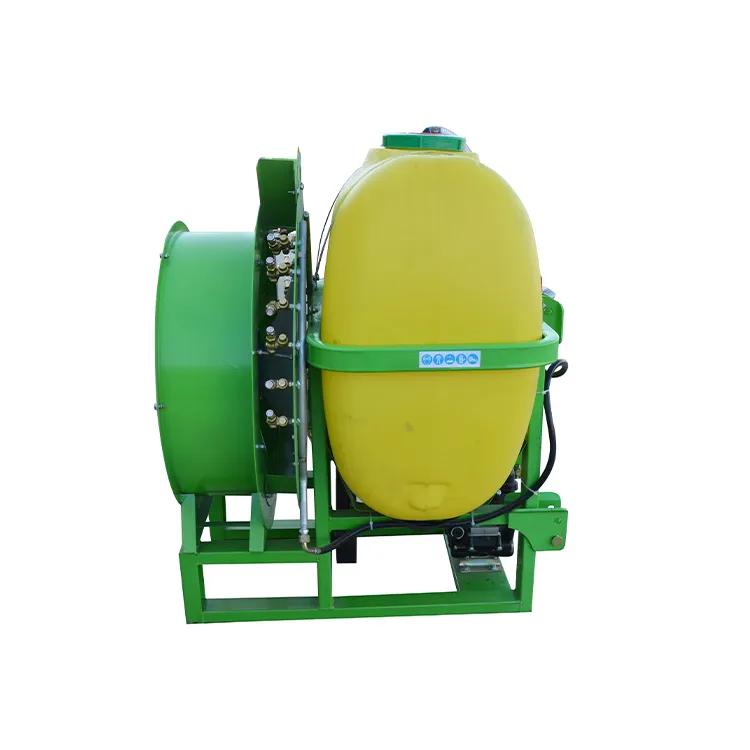Air Blast Sprayers: Revolutionizing Crop Protection and Efficiency
2024-11-06
In the world of agriculture, efficient and precise application of pesticides, herbicides, fungicides, and fertilizers is essential for maintaining healthy crops and maximizing yields. One of the most effective tools in this process is the air blast sprayer, a piece of equipment designed to distribute liquids evenly across large areas with high precision.
Whether you're a professional farmer or a hobby gardener with a small orchard, understanding the role and benefits of air blast sprayers can make a significant difference in your crop protection efforts. In this blog, we’ll explore what air blast sprayers are, how they work, and why they are a vital tool in modern farming.
What is an Air Blast Sprayer?
An air blast sprayer is a type of agricultural sprayer that uses high-velocity air to deliver chemicals or liquids onto plants. These sprayers are typically mounted on tractors, making them ideal for use in orchards, vineyards, and other large agricultural settings. The unique feature of air blast sprayers is their ability to create a strong air stream that directs the sprayed liquid with high precision, allowing for better coverage and penetration into the plant canopy.
Air blast sprayers are commonly used for spraying pesticides, fungicides, herbicides, insecticides, and foliar fertilizers, but they can also be adapted for a wide variety of other agricultural spraying applications.

How Do Air Blast Sprayers Work?
Air blast sprayers combine two main components: high-velocity air and a liquid spray system. The air is generated by a powerful fan, typically located at the rear or the front of the sprayer, which creates a strong airflow that pushes the spray liquid towards the plants.
Here’s a breakdown of how the system works:
1. Liquid Spray System: The sprayer uses a pump to draw liquid (such as pesticide, herbicide, or fertilizer) from a tank. The liquid is then pressurized and forced through a nozzle.
2. High-Velocity Air Stream: The fan at the back of the sprayer blows air through a series of tubes and ducts, creating a strong airflow. This air stream helps propel the liquid over a large area and ensures the spray penetrates through the plant’s canopy to reach leaves, stems, and even the underside of foliage.
3. Nozzle and Distribution: Air blast sprayers are equipped with adjustable nozzles that control the direction, width, and density of the spray. The nozzles can be positioned at different angles to ensure that the spray is evenly distributed over the crops, minimizing waste and ensuring precise application.
4. Air Flow Adjustments: Many air blast sprayers allow the operator to adjust the speed and volume of airflow, which can help tailor the spraying process to different types of crops, weather conditions, or target pests. The fan speed can be adjusted to increase or decrease the force of the air, which can also affect the coverage area.
Key Advantages of Using Air Blast Sprayers
Air blast sprayers offer numerous benefits that make them an indispensable tool for many farmers, especially those in orchards, vineyards, and other tree-based agriculture. Here are some of the top advantages:
1. Precision Application
Air blast sprayers allow for precise distribution of chemicals, ensuring that the correct amount of product is applied to each plant. The high-velocity air helps the liquid penetrate into the plant canopy, including the lower and middle parts of trees or vines, ensuring that the entire plant is covered. This targeted application minimizes waste and reduces the potential for runoff or environmental damage.
2. Increased Coverage
Because of the powerful airflow, air blast sprayers can cover large areas much faster than other sprayer types. The air helps the liquid reach even the most difficult-to-reach parts of a plant, such as the underside of leaves or branches, where pests and diseases often hide. As a result, air blast sprayers are ideal for orchards, vineyards, and other large-scale agricultural operations.
3. Reduced Drift
The high-velocity air can help to minimize the risk of spray drift, which occurs when the sprayed liquid is blown off-target by wind. By creating a more controlled airflow, air blast sprayers direct the spray precisely where it's needed, reducing the risk of contaminating nearby fields or crops.
4. Versatility
Air blast sprayers are versatile machines that can be adapted for a variety of crops and spraying conditions. Many models come with adjustable nozzles, allowing you to customize the spray pattern depending on the crop size, weather conditions, and the specific pesticide or nutrient being applied. Some air blast sprayers can even be fitted with special attachments for different applications, such as canopy sprayers for tall trees or vineyard sprayers for grapevines.
5. Efficient Use of Resources
Air blast sprayers maximize the use of liquids, reducing waste and saving on materials. The air-assisted system ensures an even and thorough coverage, so fewer chemicals are needed to protect plants. This helps reduce costs, improve efficiency, and minimize the impact on the environment.
6. Time-Saving
Because air blast sprayers can cover large areas quickly, they significantly reduce the time it takes to apply chemicals across a field or orchard. This is particularly useful during critical times, such as pest outbreaks or when applying nutrients at specific growth stages.
Applications of Air Blast Sprayers
Air blast sprayers are most commonly used in settings where large, dense crops require thorough spraying. Some of the most common applications include:
1. Orchards
Orchards with fruit trees (apples, citrus, peaches, etc.) benefit significantly from air blast sprayers. The ability to cover large areas efficiently and ensure even distribution across the tree canopy makes air blast sprayers ideal for applying pesticides, fungicides, and nutrients.
2. Vineyards
In vineyards, air blast sprayers are used to protect grapevines from pests, diseases, and extreme weather conditions. The airflow helps the spray penetrate through the vine canopy, ensuring that every part of the vine gets treated.
3. Large-Scale Farms
For crops such as corn, wheat, and soybeans, air blast sprayers can be used to apply herbicides, insecticides, and fungicides quickly and effectively, especially for plants with tall stems or dense foliage.
4. Nurseries and Greenhouses
Air blast sprayers can also be used in smaller-scale environments such as nurseries and greenhouses, where they help protect plants from pests and diseases while ensuring healthy growth.

Things to Consider When Choosing an Air Blast Sprayer
When selecting an air blast sprayer, it’s essential to consider a few key factors to ensure you get the right equipment for your needs:
- Tank Capacity: Choose a sprayer with a tank size that matches the area you need to cover. Larger tanks reduce the need for frequent refills, but they can also increase the weight of the sprayer.
- Fan Power: The power and size of the fan are crucial to determining how effectively the air blast sprayer can cover your crops. Look for sprayers with adjustable fan speeds to accommodate different crop types and environmental conditions.
- Nozzle Configuration: Check for customizable nozzle options that can adapt to different types of spraying, whether you’re spraying for pests or applying nutrients.
- Durability and Maintenance: Choose a sprayer made from durable materials that can withstand tough agricultural conditions. Regular maintenance and proper cleaning are also essential to ensure the longevity and performance of the sprayer.
- Compatibility: Ensure the sprayer is compatible with your existing farming equipment, whether it’s a tractor, ATV, or specialized machinery.
Conclusion
Air blast sprayers have become an indispensable tool in modern agriculture, offering precision, efficiency, and versatility for large-scale crop protection. By leveraging powerful air currents to distribute liquids evenly and with minimal waste, these sprayers ensure that every part of your plants is protected and nourished. Whether you’re managing an orchard, vineyard, or a large farm, an air blast sprayer can help you improve your spraying processes, reduce environmental impact, and ultimately increase crop yield and quality.
If you’re looking to enhance the effectiveness of your pesticide or nutrient application, an air blast sprayer may be the perfect solution to take your farm’s efficiency and productivity to the next level.


